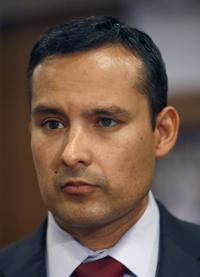The Tucson Unified School District will pilot a program next school year that seeks to reduce the amount of district-required testing students face.
The initiative involves five to six campuses that will administer one TUSD-created benchmark test rather than the three currently required of schools annually, TUSD Superintendent H.T. Sanchez told the Arizona Daily Star on Friday.
While the participating schools have not been named, Sanchez expects that they will include campuses from various areas of the district.
The program, which does not require Governing Board approval, was shared with the Star days after Board Member Mark Stegeman announced a policy proposal that also sought to reduce benchmark testing.
Under either scenario, students would still have to take AzMERIT, the state- mandated assessment.
The district’s current practice is to administer math and English language arts benchmark tests three times a year and to offer an optional fourth test.
The quarterly tests are designed by TUSD teachers from a question databank and are used to identify where students stand so that instruction can be tweaked to fit the needs of each child. They also show quarter-to-quarter growth.
The new pilot program would make it so only one set of benchmark tests would be administered in November or December after students have had several months of instruction. The timing would also allow teachers to adjust their instruction based on the results ahead of the statewide AzMERIT.
Schools participating in the pilot would also have to agree to administering short tests created by the school staff using TUSD’s question bank, which would generate data throughout the rest of the year on a student’s progress and level of understanding, Sanchez said.
For Beth Slaine, who recently ended a 15-year teaching career and now serves as a traveling teacher, working with faculty across TUSD , the district’s benchmark tests have been valuable because they help teachers address student progress. The data is easy to use and is easily shared with parents and students.
But there are logistical challenges within the existing system.
“The benchmarks often take more instructional time than we’re comfortable with because of the logistics of giving an online test,” said Slaine. “Right now you have to move your class to the computer lab — it’s a time- consuming process to take a 20- to 25-question test.”
That process takes up an entire class period, she said. If the test were to be administered in the classroom it might take up half or three-quarters of a high school class period.
When you build in the time spent on AzMERIT, which Sanchez estimates as taking up about a week of instructional time, Slaine says testing does impact the ability to teach.
That frustration is what prompted Stegeman to propose that TUSD cut the number of benchmark tests issued by the district down to two a year. His plan also would have allowed schools to petition for an exemption on the second test.
“Teachers and principals constantly express concerns over the volume of standardized testing that students, especially younger students, endure,” Stegeman wrote in a letter to constituents.
While Sanchez has already decided to implement his pilot project, an idea he says he has been considering for some time, he still plans to bring Stegeman’s policy proposal to the board for discussion in May or June.
“The end goal is to reduce testing,” Stegeman told the Star, adding that when he put the idea forward he was open to suggestions to make it better.
While the pilot program is underway, Sanchez says he hopes to learn what it takes to scale back district-wide assessments while ensuring that schools have the data they need.
“If it works brilliantly, we take it to scale in 17-18,” Sanchez says of the potential time frame for district-wide adoption. “If it doesn’t work brilliantly, then we need to assess why, because ultimately the ideal is for every teacher and every principal on every site to use assessment not as a hammer to hit people with but rather as a resource and a tool to adjust and inform instruction.”




